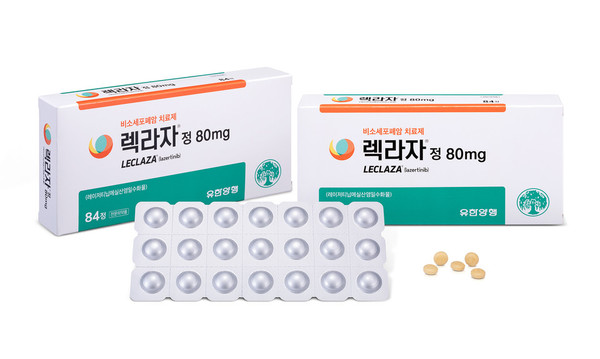Yuhan Corp.’s non-small cell lung cancer (NSCLC) treatment Leclaza (ingredient: lazertinib), which won reimbursement on July 1, quickly entered the prescription drug market.
The lung cancer drug passed drug committee (DC) reviews at major tertiary hospitals in Seoul and regional general hospitals will soon prescribe the treatment.
Industry sources said Friday that Leclaza passed the DC review at the Samsung Medical Center and the Severance Hospital. Another general hospital in the Seoul metropolitan area and a provincial general hospital are also expected to begin prescribing Leclaza soon.

On June 25, the Health Insurance Review and Assessment Service (HIRA) held a meeting of the health insurance policy review committee to decide whether to grant reimbursement for Leclaza and how much the reimbursement rate should be. As a result, a dose of 240 mg daily is recommended for Leclaza, which is priced at 68,964 won ($60.38).
Leclaza is authorized to treat patients with EGFR T790M mutation-positive locally advanced or metastatic NSCLC who were previously treated with an EGFR-TKI.
Leclaza is expected to compete against AstraZeneca’s third-generation EGFR-TKI Tagrisso (osimertinib).
If a patient takes three tablets of 80 mg Leclaza daily, the drug costs 206,892 won per day. This is 5 percent cheaper than Tagrisso's daily cost of 217,782 won.
After passing the DC reviews at the Samsung Medical Center and the Yonsei Cancer Center, patients received Leclaza at the hospitals.
Professor Lim Sun-min of the Medical Oncology Department at the Yonsei Cancer Center said among patients who developed resistance to existing first, and second-generation EGFR targeted therapies, half of them develop new EGFR T790M mutation.
Leclaza targets this EGFR T790M mutation, and it is also highly effective in patients with brain metastasis because Leclaza passes through the blood-brain-barrier (BBB).
“It is very meaningful that a local lung cancer drug became a possible option for those who failed first-line EGFR chemotherapy,” Lim said.

